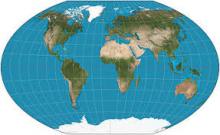
Quote of the month: "Since we didn't know at the time that a particular sneeze in Wuhan can have a serious impact in Ouagadougou or London, there is probably a good operational argument for not making a distinction between "public health" and "global health" at all” (HIFA steering group member Chris Zielinski, UK)
“Global health is public health somewhere else”. This was a new definition of ‘global health’, proposed by the authors of a commentary published in BMJ Global Health in January 2020, and shared with HIFA members. The authors acknowledged that, whilst many definitions of ‘global health’ exist, “none properly distinguish this field from public health more generally”.
“I find two main problems with the suggested definition of global health as ‘public health somewhere else’: 1) it is too narrow and 2) it sounds dismissive”, stated Chris Zielinski. Chris said it would be more inclusive and positive if the definition were amended to “public health everywhere else”. (Indeed, why not drop the "else" and say, simply, "public health everywhere"?)
Armand Nkwescheu (HIFA member, Cameroon) offered a different interpretation of the authors’ use of the term ‘somewhere else’. “'Global health as public health somewhere else' also means the problem at stake is 'already boiling' somewhere else”, he told the HIFA forum, “and as any public health issue, it can reach your environment within a short period of time”. He felt that the use of ‘somewhere else’ did not negate the seriousness of a public health issue, but rather “that it has started somewhere, the source is identified”.
However, other members shared the concerns expressed by Chris Zielinski and made their views known on the forum. Enku Kebede-Francis (HIFA Country Representative, USA) felt that any definition of ‘global health’ should emphasise ‘what is common to all’, which aligns with the WHO definition of ‘public health’ as, “the art and science of preventing disease, prolonging life and promoting health through the organized efforts of society” (Acheson, 1988; WHO). Mirjana Radovanovic (HIFA Country Representative, Serbia) concurred. “For me as a paediatrician, no health problem in any part of the world is ‘something that's going on out there’.
HIFA Steering Group member Joseph Ana suggested that Seye Abimbola, Editor-in-Chief, BMJ Global Health had articulated the most accurate definition of ‘global health’, to date. Dr Abimbola argued that ‘global health’ is not defined by “global cooperation, national boundaries and specific categories of actors''. As he put it, “global health is about health equity everywhere”.
As I write this, the global death toll from the coronavirus (COVID-19) epidemic has exceeded 3,000 and the list of affected countries around the world continues to rise. The World Health Organization has announced that the world is now in “uncharted territory”. HIFA is buzzing with discussion on the multiple information aspects of this emerging pandemic, and this will be the subject of my next blog. This a critical time for global health and public health.
Metrics: In January 2020 HIFA (English) exchanged 170 messages from 70 contributors in 29 countries (Argentina, Cameroon, Canada, Germany, Honduras, India, Iran, Italy, Jordan, Kenya, Mozambique, Netherlands, Nigeria, Norway, Pakistan, Serbia, Singapore, South Africa, Spain, Swaziland, Switzerland, Tanzania, Thailand, Tunisia, Uganda, UK, USA, Zambia, Zimbabwe). Our top contributors were Joseph Ana, Nigeria (11) and Chris Zielinski, UK (6). Thank you all for sharing your views and your experience.
Martin Carroll was previously Head of the International Department at the British Medical Association, London UK, and has worked on issues affecting health in LMICs since 2003. He represented the BMA on the HIFA Steering Group from 2008-16 and is now an independent HIFA Steering Group member. Martin is a member of three HIFA working groups: Multilingualism, Evaluating the Impact of Healthcare Information, and Social Media. He is also the HIFA blogger. Twitter: @MMCarroll
Credit: World map, Wikipedia.

